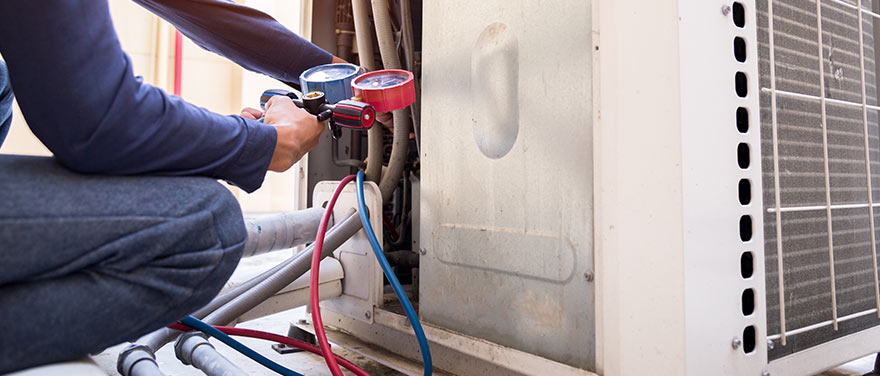Why is There Ice on my Air Conditioner?
Ice on your air conditioning unit often happens because of low refrigerant, or because air is not flowing properly through the system.
If you have ice on your air conditioner, shut the unit off and allow it to defrost. This is required to troubleshoot the problem.
A frozen AC unit can dramatically reduce efficiency, which can cause the AC to work much harder to cool your home. You may notice this if the unit is running a lot, but not cooling well. A frozen AC can also cause the system to not work at all. ACs can freeze even during the hottest summer months.

What Causes Ice on an AC?
Cause: Low Refrigerant
If your refrigerant (AKA freon or R-22) is low, you may have a leak. Low refrigerant lowers the pressure in the system, which also causes lower temperatures. This can cause ice to form on the AC’s evaporator coil.
Solution: Have a qualified HVAC technician repair the leak and recharge the coolant. Not, air conditioners are closed systems, so you should never run low on refrigerant unless there is a leak. It is imperative you fix the leak, rather than just refilling the system.
Prevention: Have your air conditioner inspected and serviced every spring to catch potential problems and make sure it has the right amount of refrigerant.
Cause: Dirty Evaporator Coil
A dirty evaporator coil can cause ice to form on your air conditioner because it restricts airflow through the unit. A dirty coil can also make the AC use more electricity, causing damage to the compressor.
Solution: To prevent your cooling system from breaking down, shut the unit off until the coil is cleaned or replaced.
Prevention: Clean the evaporator coil regularly.
Cause: Mechanical Failure
Wiring, broken valves, a damaged fan, kinked refrigerant lines, or a blocked drain can all cause your central cooling system to freeze up.
Solution: Have a licensed HVAC professional inspect and repair the unit.
Prevention: Regular maintenance of your heating and cooling systems, generally in spring and fall, will reduce the risk of these issues.
Cause: Restricted Airflow through the AC unit
In order to function properly, air conditioners rely on air flowing through the system. Too little airflow reduces the temperature, causing the AC unit to freeze up. Airflow can be restricted by dirty air filters, closed vents, clogs or leaks in the ductwork, or something blocking the outdoor unit.
Solution: Depending on what’s restricting the airflow, you may need to change your air filter, clean your ductwork or repair your air ducts.
Prevention: Change the air filter once a month during heavy-use times like summer, and consider having your ductwork sealed.
Cause: Outside Temperature is too Cold
Air conditioners weren’t designed to be used when the outdoor temperature is below 62 degrees Farenheit.
Solution: Turn off the AC unit to allow it to thaw.
Prevention: Turn off the air conditioner at night when the temperature is predicted to be in the low 60s or lower.

How Does an Air Conditioner Freeze?
An air conditioner circulates refrigerant through the outdoor unit, changing it from a gas to a liquid. The liquid is then forced through an evaporator coil. A fan circulates air through the evaporator, which exchanges the thermal energy with the air around it. At this point, the refrigerant turns from liquid into vapor, removing heat from the surrounding air. As heat is removed, the air is cooled and sent back into the house.
Next, the condenser turns the refrigerant vapor back into a liquid, removing any heat. When the fluid leaves the evaporator again, it is a cool gas. It then returns to the condenser, where the process starts over. This process repeats while your home is being cooled. The system then runs as needed, in order to keep the correct temperature as set by your thermostat.
Ice can form on your air conditioner when the temperature in the condenser evaporator coil falls below freezing. This often happens because of low refrigerant, or a refrigerant leak. It can also happen due to dirty coils, a broken fan, faulty wiring, or clogged air filters.
How Do I Know if There is Ice Inside my AC?
Ice inside your AC unit can’t be seen as easily, but it can cause damage, so it requires service immediately. In the humid climate here in the Kansas, it’s common for air conditioners to drip water. But, if a lot of water is dripping inside the unit, that’s a sign of trouble. A full drip pan can indicate melted ice inside the AC system. Another red flag is the sound of ice chunks falling, like when your refrigerator defrosts. If you notice either of these signs, shut off the unit and call an air conditioning technician.
If you’re having issues with a frozen AC in the Wichita area, get in touch for an Air conditioner repair estimate.
We do our best to provide current and accurate information, but this content could contain errors or information that is not correct for your situation or equipment. Resources found on our website are provided as general information. Reddi Industries does not assume any liability resulting from the provided information. If you attempt to repair or modify HVAC, plumbing, electrical, or other equipment in your home or business, always consult your equipment’s operating manual first, and only do so if you are qualified.
